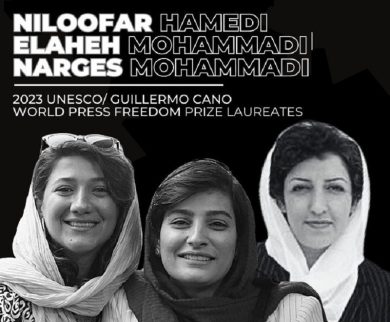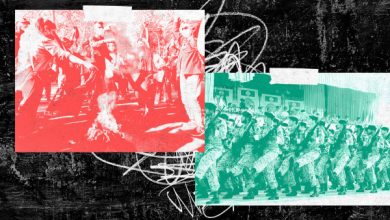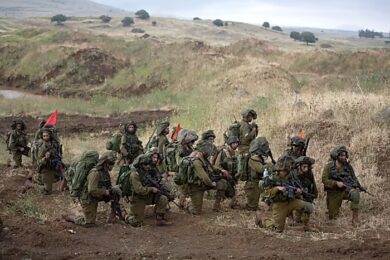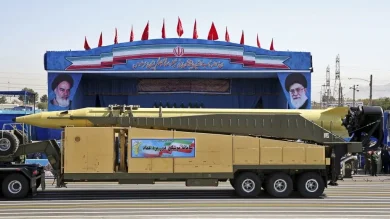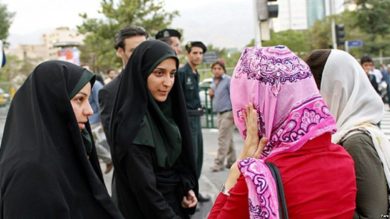In the Islamic Republic of Iran, a woman who dares to speak truth to power knows what awaits her: surveillance, harassment, arrest, and, ultimately, prison. Life behind bars for women who challenge the regime is not just a form of punishment—it is a calculated tool of repression, intimidation, and erasure. These women are not criminals. They are teachers, journalists, students, mothers, artists, lawyers. Their only crime? Daring to demand freedom, equality, and justice.
The Islamic Revolutionary Guard Corps (IRGC), the regime’s most powerful military and intelligence institution, plays a central role in targeting and imprisoning women dissidents. Through arrests, torture, and psychological abuse, the IRGC uses prisons as political weapons—meant to break not just bodies, but spirits.
But if anything, prison has made Iran’s women activists stronger, not weaker. This article examines what really happens behind prison walls, shares stories of the women who continue to resist from within, and explores why the regime fears them so much.
1. The IRGC’s Role in Targeting Women Activists
A System Built to Crush Dissent
The IRGC controls major elements of Iran’s prison and intelligence systems. Its Intelligence Organization is responsible for monitoring, arresting, and interrogating citizens accused of “anti-regime” activity. Women who participate in protests, publish on social media, or speak to foreign media are often accused of vague national security crimes like “propaganda against the state” or “collaboration with hostile powers.”
A Gendered Target
Iranian women activists are treated with exceptional cruelty. Their resistance is considered not just political but moral rebellion. The state views women’s independence—especially when visible in public life—as a threat to the ideological foundation of the Islamic Republic.
The IRGC and judiciary target:
• Women protesting mandatory hijab laws.
• Feminist journalists and bloggers.
• Lawyers defending political prisoners.
• Activists opposing gender apartheid.
2. The Prison Pipeline: From Arrest to Interrogation
Nighttime Raids and Forced Confessions
Arrests are often violent, conducted in the dead of night without warrants. Women are blindfolded, separated from their families, and taken to undisclosed locations. Interrogations begin immediately—before legal counsel is granted. The goal is not justice. It’s compliance.
Interrogations typically involve:
• Physical abuse: beatings, prolonged stress positions, sleep deprivation.
• Psychological abuse: threats to family, sexual humiliation, solitary confinement.
• Forced confessions: women are coerced into admitting crimes they didn’t commit, later broadcasted on state TV as “proof” of their guilt.
No Due Process
Trials for women political prisoners are often short, closed-door affairs where the accused are denied the right to speak or choose their attorney. Sentences are handed down with no evidence beyond “confessions” obtained under torture.
3. Inside Iran’s Most Notorious Women’s Prisons
Evin Prison
Located in Tehran, Evin is one of the regime’s most feared prisons. It is operated partly under the IRGC’s supervision and houses many high-profile political detainees.
Conditions include:
• Overcrowding and unsanitary living spaces.
• Surveillance 24/7, even in restrooms.
• Denial of medical care, including treatment for chronic conditions or injuries sustained during arrest.
Evin is also known for housing both male and female prisoners, which has led to further abuse and sexual violence scandals.
Qarchak Prison
Qarchak, in Varamin, is considered one of the most dangerous prisons in the country—especially for women.
Prisoners report:
• Being denied sanitary products and clean water.
• Food contaminated with dirt or insects.
• Being housed with violent offenders as an intimidation tactic.
• Rape and beatings by guards as punishment for political expression.
4. The Cost of Defiance: Stories from Inside
Narges Mohammadi – Nobel Peace Prize Laureate
Mohammadi, a journalist and human rights defender, has been arrested multiple times for her work against the death penalty and prison conditions. From behind bars, she has:
• Published letters exposing torture.
• Organized protests among fellow inmates.
• Continued her advocacy despite being denied visits with her children.
Her resilience in prison is an inspiration to many and proof that the IRGC’s tactics have failed to silence her.
Sepideh Gholian
A journalist and labor rights activist, Gholian was arrested for covering a workers’ protest and later tortured into confessing to crimes on state TV. Even after her release, she returned to protest publicly and was re-arrested.
She has written about:
• Being beaten during interrogations.
• Forced confessions scripted by intelligence officers.
• Her refusal to be broken, even under intense pressure.
Nasrin Sotoudeh
A human rights lawyer, Sotoudeh has spent years in and out of prison for defending women’s rights, especially those accused of removing their hijab. Her sentencing—38 years in prison and 148 lashes—was one of the harshest ever given to a lawyer in Iran.
Despite the sentence, she continues to speak out and inspire thousands inside and outside Iran.
5. Psychological Warfare and Social Erasure
Breaking the Will
The IRGC’s objective is not just to imprison women, but to isolate them, erase them, and make others fear becoming like them. This includes:
• Denying prisoners access to news and family.
• Banning books, pens, and paper to prevent activism.
• Threats of extended sentences for minor infractions in prison.
Women are frequently released on the condition that they never speak publicly again, under threat of re-arrest.
After Prison: A New Type of Surveillance
Women who are released are rarely free:
• They are banned from working, especially in education or media.
• They are monitored online and offline.
• They often face repeated summonses to court or police interrogations.
The goal is to turn activists into silent ghosts—present, but voiceless.
6. Why the Regime Fears Them
The Power of a Woman Who Won’t Back Down
The regime fears women because they expose its greatest weakness: that its power is fragile, built on fear and propaganda. A woman who continues to speak out despite prison, threats, and torture proves that the system is not invincible.
Women like Mohammadi, Sotoudeh, and Gholian are not just symbols of resistance. They are evidence that the regime is failing to control its own citizens.
Gender and Political Power
When a woman removes her hijab, speaks freely, or demands equal rights, she is rejecting the core ideology of the Islamic Republic. That rejection is contagious. It inspires others. It spreads. And the regime knows it.
7. How the World Can Help
Global Solidarity
International pressure works. Prisoners like Atena Daemi and Golrokh Iraee have reported better treatment when international media covered their cases.
Ways to help:
• Share the names and stories of women political prisoners.
• Demand that governments condemn the IRGC’s human rights violations.
• Pressure countries to sanction IRGC officials responsible for torture and imprisonment.
Designating the IRGC
More countries should follow the U.S. in designating the IRGC as a terrorist organization. Doing so would:
• Cut off its financial networks abroad.
• Prevent IRGC members from traveling freely.
• Symbolically align the world with Iran’s brave women.
Conclusion
Life behind bars for women in Iran is brutal—but it’s not the end of the story. These women emerge stronger, louder, and more determined than ever to see Iran free. The regime may believe prison can silence them. But in reality, it amplifies their voices.
Every woman imprisoned for her beliefs is a reminder of the courage that drives Iran’s revolution forward. The world must not forget their names, their suffering—or their strength.
Join Our Newsletter!
Stay informed with the latest updates, news, and ways to take action in the fight for justice and global security. Sign up now to get updates delivered straight to your inbox!

